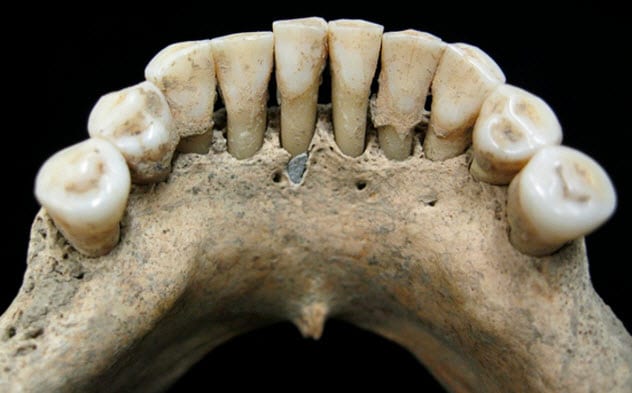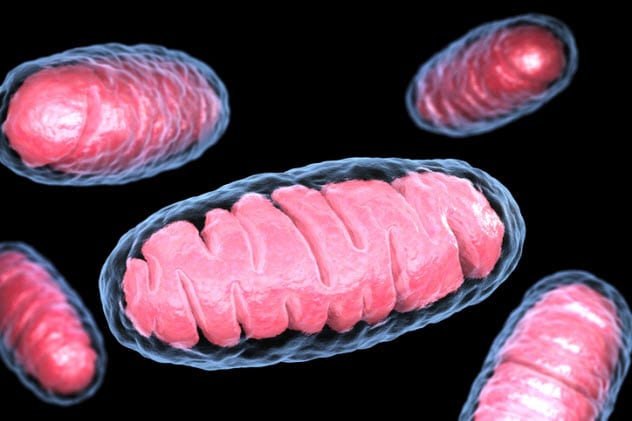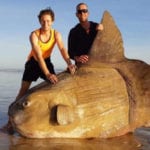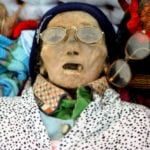 History
History  History
History  Health
Health 10 Everyday Activities That Secretly Alter Consciousness
 History
History Top 10 Historical Disasters Caused by Someone Calling in Sick
 Animals
Animals 10 New Shark Secrets That Recently Dropped
 Movies and TV
Movies and TV 10 Forgotten Realities of Early Live Television Broadcasts
 Technology
Technology 10 Stopgap Technologies That Became Industry Standards
 Weird Stuff
Weird Stuff 10 Wild Facts About Taxidermy That You Probably Didn’t Know
 Travel
Travel 10 Beautiful Travel Destinations (That Will Kill You)
 Miscellaneous
Miscellaneous 10 Modern Marriage Rituals Born from Corporate Branding
 Weird Stuff
Weird Stuff Ten Bizarre Visions of 2026 from Fiction
 History
History 10 “Modern” Problems with Surprising Historical Analogs
 Health
Health 10 Everyday Activities That Secretly Alter Consciousness
 History
History Top 10 Historical Disasters Caused by Someone Calling in Sick
Who's Behind Listverse?

Jamie Frater
Head Editor
Jamie founded Listverse due to an insatiable desire to share fascinating, obscure, and bizarre facts. He has been a guest speaker on numerous national radio and television stations and is a five time published author.
More About Us Animals
Animals 10 New Shark Secrets That Recently Dropped
 Movies and TV
Movies and TV 10 Forgotten Realities of Early Live Television Broadcasts
 Technology
Technology 10 Stopgap Technologies That Became Industry Standards
 Weird Stuff
Weird Stuff 10 Wild Facts About Taxidermy That You Probably Didn’t Know
 Travel
Travel 10 Beautiful Travel Destinations (That Will Kill You)
 Miscellaneous
Miscellaneous 10 Modern Marriage Rituals Born from Corporate Branding
 Weird Stuff
Weird Stuff Ten Bizarre Visions of 2026 from Fiction
10 Unusual Finds That Challenged Scientific Beliefs
Plenty of truths pretend to be mysteries or facts. Dedicated researchers whittle away at puzzles, sometimes making great new finds without solving the whole shebang.
However, real progress means ousting the pretenders—those pesky facts that convince scholars of their authenticity for years when, in reality, they are mere misconceptions. From a dangerous vitamin everyone loves to herbivores eating their friends, the simplest of facts are no longer so simple.
10 The Aging Plateau

A widely accepted concept is late-life mortality deceleration. According to this theory, some people get so old that even their aging slows down. This “aging plateau” means that, statistically, a 105-year-old has no greater chance of dying than a person who is 90. The process is not fully understood or even unanimously explained.[1]
In 2018, the plateau was challenged. Opposing researchers claimed that the age surveys supporting the “phenomenon” were faulty. There was a good chance that some seniors had their ages recorded incorrectly. A deliberate demonstration showed that just a few incorrect entries could skew the outcome in a big way.
An actual study done on the life span of Italians found evidence of the plateau but also matched a hypothetical outcome if 1 in 500 people had their ages wrongly listed. However, each would need to be grossly misreported and the study worked with a hypothetical scenario, not actual survey mistakes. Either way, somebody is wrong.
9 China’s Ozone Problem

In 2013, China’s smog problem was so bad that skylines vanished from cities. Within four years, the country achieved the remarkable feat of lowering eastern China’s concentrations of PM 2.5 particles by 40 percent. These ultrafine boogers are dangerous to the human respiratory system.
However, the progressive step turned dark. In a move that nobody could predict, ozone levels increased in the cities. High up in the sky, ozone is great. At ground level, it qualifies as air pollution. In fact, ozone is a really bad thing to inhale.
A survey found that China’s megacities, including Beijing and Shanghai, were swamped with this potent pollution. The reason? The well-meaning attempt to remove the PM 2.5 particles also eradicated the very thing that soaked up the chemicals that produce ozone. All this time, the PM 2.5 fog had acted like a giant sponge that kept it under control.[2]
8 Nun With Blue Teeth

Around AD 1100, a nun died at a monastery in Dalheim, Germany. When researchers recently examined her skull, they found something odd. The woman, who was between 45 and 60, had blue stains on her teeth.
X-ray spectroscopy revealed that the flecks were lapis lazuli, a semiprecious stone that was prized during the Middle Ages. It was the main ingredient in ultramarine, a rare and expensive blue paint. Ultramarine was used solely for the lavish decoration of religious books. Only the most skilled painters were allowed to use it.
The pigment saturated layers of the nun’s dental plaque thanks to years of licking paintbrushes. This technique was known to be used by painters when they faced particularly detailed work. However, it is the first physical proof of the habit.[3]
Additionally, it proved that nuns also worked on religious manuscripts, a domain thought to belong to monks. Since lapis lazuli only came from mines in Afghanistan 4,800 kilometers (3,000 mi) away, it also revealed that Germany and Asia had extensive trade links almost 1,000 years ago.
7 Extra Denisovan Pulses

Scientists have known for a long time that humans interbred with two ancient hominids. Although the Neanderthals and Denisovans are extinct as individual species, their DNA continues in certain populations today. Our gene map shows two “pulses,” or sudden concentrations of hominid interbreeding. Both happened in Siberia’s Altai region thousands of years ago.
In 2018, a study searched for a third interbreeding event by examining the genetic codes of 5,500 volunteers from Asia, Europe, and Oceania. They found enough foreign hominid DNA to prove that Siberia was not the only place where humans absorbed pulses. In a surprising twist, Denisovan influence occurred twice outside the Altai Mountains.
Barely any fossils of these rare hominids exist. Yet, back in the day, they were plentiful enough to mingle heavily with humans who traveled across South Asia. The groundbreaking study found a Denisovan pulse to the north in living Chinese, Japanese, and Vietnamese. Another pulse showed up to the south, likely the result of humans meeting Denisovans while migrating to Papua New Guinea.[4]
6 Paternal Mitochondrial DNA

Mitochondria nest inside cells and also provide them with energy. As a rule, people only inherit their mother’s mitochondrial DNA. The father’s is destroyed after conception.
In 2018, a new study challenged this concrete belief. Although maternal inheritance is a given, it would appear that the father’s mitochondrial DNA can do three things—avoid the next generation completely, pass on a tiny amount, or almost entirely eclipse the mother’s. This mercurial behavior challenges everything researchers know about this genetic material.
The Cincinnati study found 17 people who inherited it from both parents, and this finally lends some credence to a 2002 case from Denmark. This man appeared to have inherited 90 percent of his father’s mitochondrial DNA, but everyone thought it was a technical error.[5]
Interestingly, it could be a family thing. The Cincinnati hospital also found the biparental inheritance in 10 people over three generations from the same family.
5 Meat-Eating Hares

Canada’s snowshoe hares are supposed to be herbivores. A recent study accidentally uncovered the hairy truth. Not only do they eat meat, but the hares are also cannibals.
Researchers rigged a remote trail near the Alaskan border with cameras. They put out hare carcasses as bait and hoped to capture photos of predators scavenging on them.
Over a period of 2.5 years, 20 dead hares were consumed by their living brethren. For the first time, the photographs captured this unexpected, if not shocking scavenging behavior in hares. Researchers also found that winter-hungry hares were not picky about the species. In one case, they even ate their main predator—a dead Canada lynx.[6]
This meaty turn appears to be a survival strategy rather than preference. During the summer, snowshoe hares nibble exclusively on vegetation. Winter turns the region into one of the coldest on Earth. When foliage becomes scarce in such conditions, any protein is welcome.
Bizarrely, the hares also consumed feathers from dead birds. The reason remains unknown as feathers offer little nutrition.
4 How Tornadoes Really Form

Conventional belief teaches that a tornado forms inside the clouds and then grows a funnel down to the ground. A study released in 2018 told a different story. Tornadoes start on the ground.
For years, climatologists chased the deadly swirls and four spawned by rare supercell storms changed the game. Tornado intensity ranges from EF1 to EF5. A pair was recorded in 2012 in Kansas—both babies at EF1. An EF3 hit Oklahoma in 2011. A monster swept through El Reno in 2013. This EF5 was the widest tornado ever recorded, measuring 4.2 kilometers (2.6 mi).
Researchers had a hilltop view of the giant which allowed them to capture the moment of its birth. The high-tech equipment found signs that the tornado formed 10 meters (32 ft) above the ground. Droves of storm chasers provided photos of the event, which also supported the finding.[7]
This prompted a closer look at the data. Soon, it became clear that wind rotation began on the ground long before anything churned in the clouds. The other three tornadoes showed similar data.
3 Lizard That Breathes Underwater
A group of lizards called anoles fascinate researchers so much that thousands of studies have been done on them in the past 50 years. Despite being thoroughly studied, one species did something so strange that scientists had no answer. The Costa Rican river anole disappears underwater for up to 15 minutes. The best assumption was that they could hold their breath really well.
In 2018, biologists worked with filmmakers to try to solve the mystery. What they captured was astonishing. For the first time, the footage revealed that the anoles did not stop breathing once they had sunk to the bottom.[8]
Instead, the female they filmed had a bubble on her head. For 10 minutes, it grew and shrank repeatedly, almost as if she were recycling the air within. This behavior had never been seen in lizards or any species with a spine. As astonishing as it was to find an anole with its very own “diver’s tank,” scientists do not know how the oxygen is stored or exactly how they tap into the bubble.
2 Vitamin D Is Not A Vitamin

Vitamin D is the darling of thousands. For decades, governments and doctors encouraged swallowing more of this wonder vitamin, linking it to a host of benefits and disease prevention. In recent times, scientists focused on a particular benefit—the prevention of bone fractures. As the largest study of its kind, it involved over 500,000 people and 188,000 fractures. No evidence was found that vitamin D stopped breaks from happening.
The truth about this supplement is scary. It is not a true vitamin but an unsafe steroid. The popularity comes from outdated studies in the 1980s and marketing skills of food manufacturers and vitamin companies.[9]
Apart from taking increasingly stronger dosages, people get extra vitamin D through exposure to sunshine and food. For this reason, clinics see a rise in overdose cases. At the lower end of the problem, nobody really knows what qualifies as a vitamin D deficiency. Ironically, several studies have shown that dosages above 800 IU actually increased the chance of a fracture.
1 Mona Lisa‘s Gaze

So many people have claimed that Leonardo da Vinci’s painting has stared at them that the phenomenon became known as the “Mona Lisa effect.” Her gaze is said to follow observers no matter where they are in the room.
When researchers recently worked on artificial intelligence programs, they wanted the avatars to really look at people. Due to her famous “effect,” the Mona Lisa was included in the study. At one point, the team realized that she was not gazing soulfully at any of them.
To confirm this, they asked volunteers to view the painting on a computer. A ruler in front of the screen carried numbers, and participants picked the one which intersected with her stare. The ruler was then moved to a second point, and the exercise was repeated.[10]
The two sets of answers gave researchers an angle. Mona Lisa does not stare at anyone. Her gaze is 15.4 degrees to the right of observers. The real mystery is why people continue to believe otherwise.
For more unusual finds that challenge our beliefs, check out Top 10 Unusual Finds Involving Rare Remains and 10 Unusual Finds And Studies Involving Pterosaurs.








